How to Be More Productive at Work Thanks to Mindfulness? Guided meditation for productivity
Do you find it hard to focus on your tasks? Do you often wonder how to increase your productivity? Not being able to focus during work is an issue that affects a lot of people and more than often it leads to a decrease in productivity. Whether you’re working from home or from the office, it’s easy to get distracted by the outside world, especially if your job requires you to sit in a chair, staring at your computer screen and typing the whole day. Some articles may pop onto your screen, take up your interest and suddenly you’ve been reading different posts, forums, and articles on the subject that you got caught up in for an hour. Your coworker may ask you a question and suddenly you’ve been talking for twenty minutes and no work has been done. Not to mention going on social media to check on your friends and staying there, scrolling for another twenty minutes.
Truth be told, there is temptation at every turn. We are attacked by information, ads, and clickbait headlines on every site on the Internet. And even though it’s healthy to take breaks from work, to find the time to talk to your colleagues, drink coffee, and scroll through Facebook, it can just as easily become a black hole that will swallow you whole.
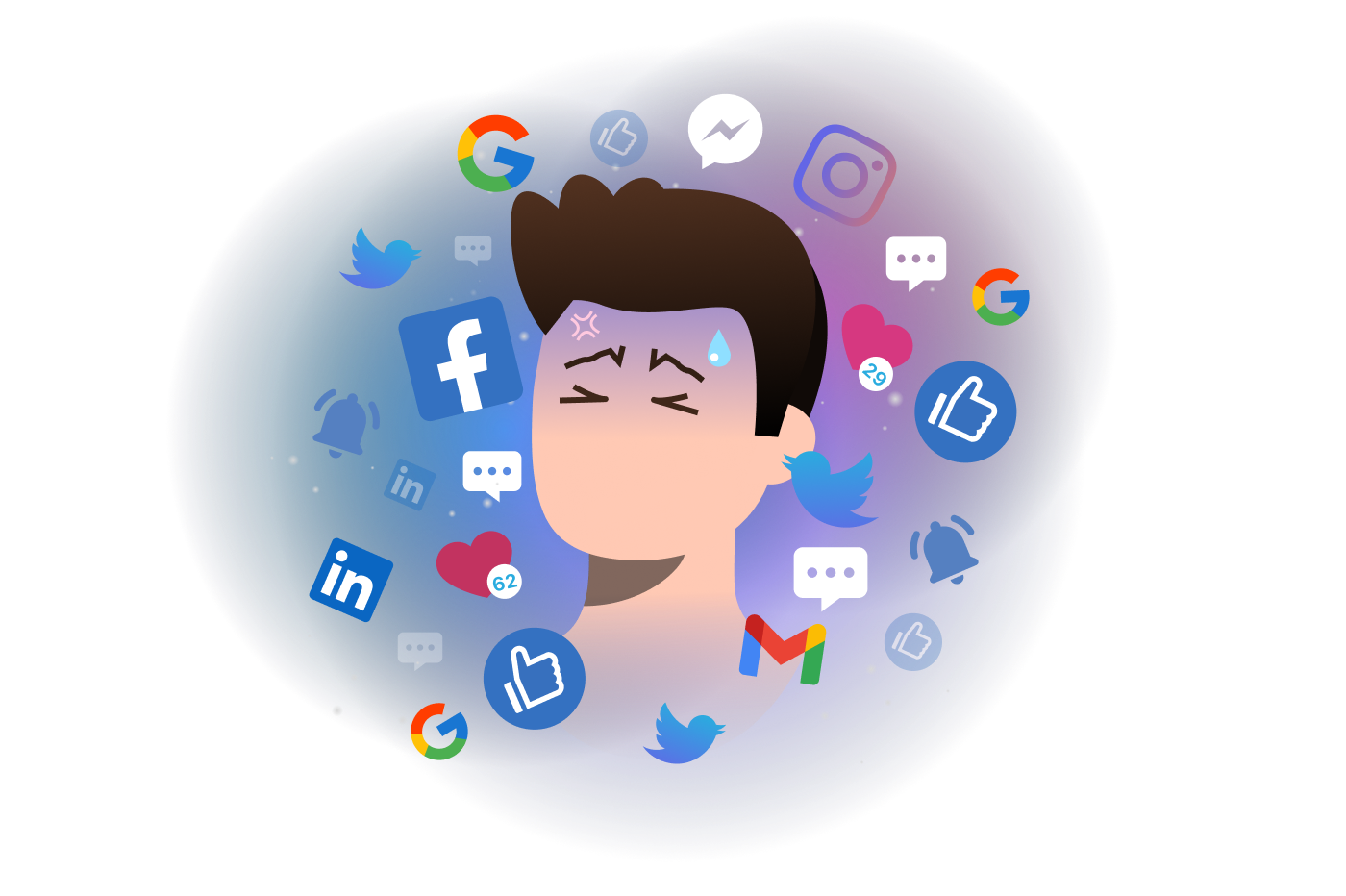
Being productive is even more challenging now in the midst of the Covid-19 pandemic. Because of the months of isolation, working from home, living in constant fear and anxiety, many people started feeling demotivated and discouraged which led directly to the decrease in their productivity and thus to the feeling of failure, uselessness, or frustration. It affected our everyday life and made many of us struggle with mental health issues.
If you're asking yourself how to overcome it and how to take care of your well being, you're in the right place. We know how to strengthen your brain, make it easier to focus on your tasks, limit mind wandering and start being productive again. There is one proven way: Mindfulness.
What is mindfulness?
Mindfulness is often defined as staying in the present moment, keeping full self awareness of what's happening at the moment.Not thinking about your kid’s sickness or the argument you had this morning, not worrying about what you have to do after you get off work that day, and so on. It shouldn’t be identified with not thinking at all though. Being mindful is about getting rid of distractions, not all thoughts.
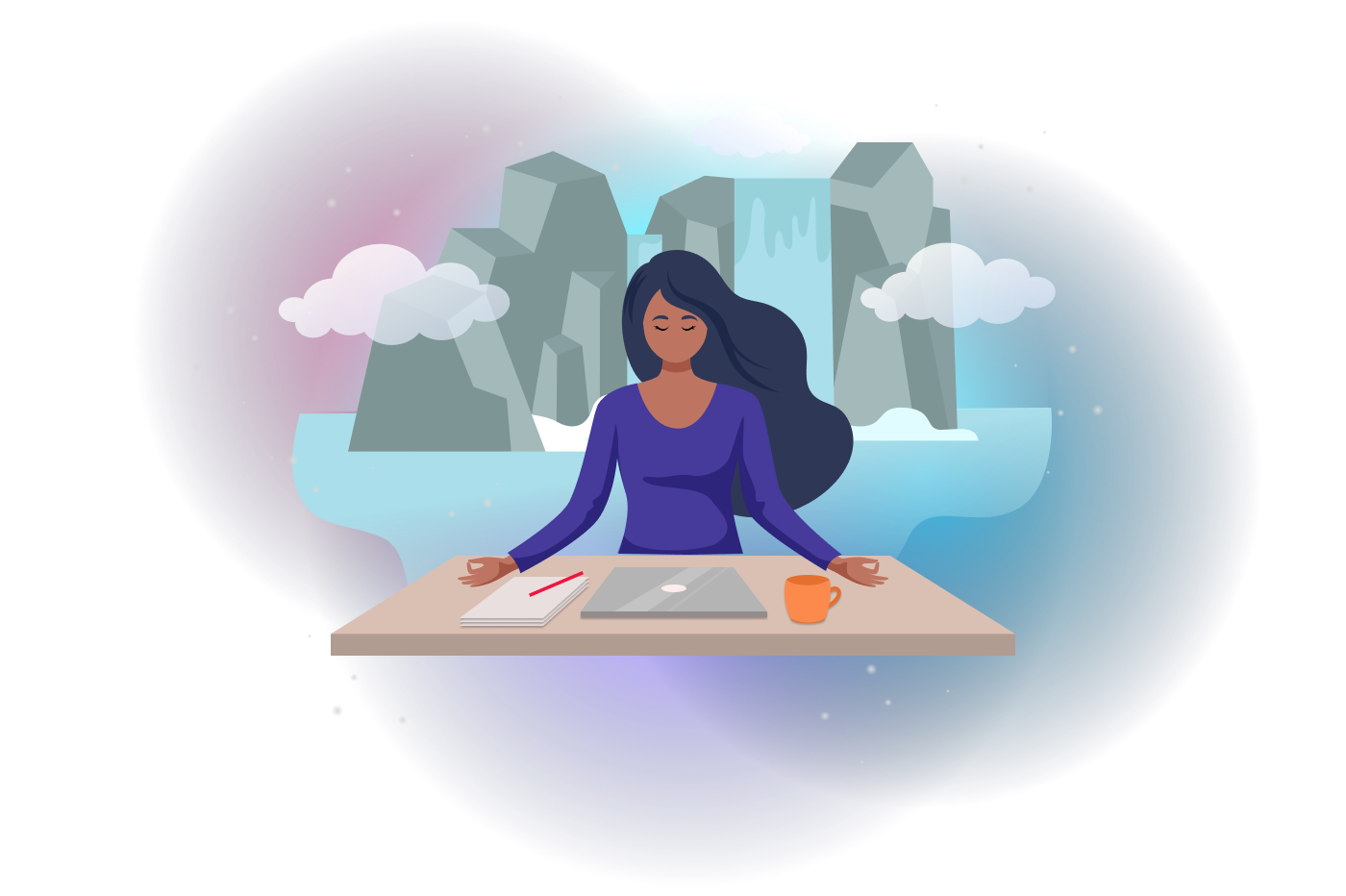
It's more about creating space for our thoughts and letting them be but not focusing on them.
So, how to practice mindfulness meditation? One way to do it is through meditation practice. Mindfulness isn't something that happens only when you meditate, but meditation is one of the most broadly practised mindfulness techniques. This is why a lot of the research about mindfulness concentrates on meditation.
As was already said, when you are mindful, you turn your attention entirely to the present moment. That also means that whenever you’re approaching a task, a problem, or an exercise, you should always prioritise the process and not the outcome. Being mindful excludes focusing on the results of your actions and on how they will affect you. Instead, it requires you to submit your full attention to the task at hand. Staying focused on your work instead of thinking about the future is one of the steps that you can take to increase your productivity. If your mind wanders or if you have a lot of inner distractions, it's okay.
The benefits of mindfulness meditation
Mindfulness can benefit your health BIG TIME.One of the most important benefits of meditation and mindfulness is that it reduces depression. Mindfulness, alongside meditation, body scan exercise and yoga, is incorporated into therapy (Mindfulness-based cognitive therapy), which is not only used to treat depression but also to ensure that patients don’t suffer from relapse of depressive symptoms. Practicing mindfulness can also help you identify and manage your feelings, reduce stress and anxiety. Meditation improves your memory and your cognitive abilities. Regular meditation can also lead to enhanced creativity, better blood circulation and increased productivity.
All of these things may affect your productivity at work. For instance, stress is generally thought to be helpful when it comes to productivity, but according to what is known as “The Yerkes Dodson law” performance increases with physiological or mental arousal (stress) but only up to a point. When the level of stress becomes too high, performance decreases. So not only can mindfulness help you with reducing stress but also by doing so meditation makes you highly productive.
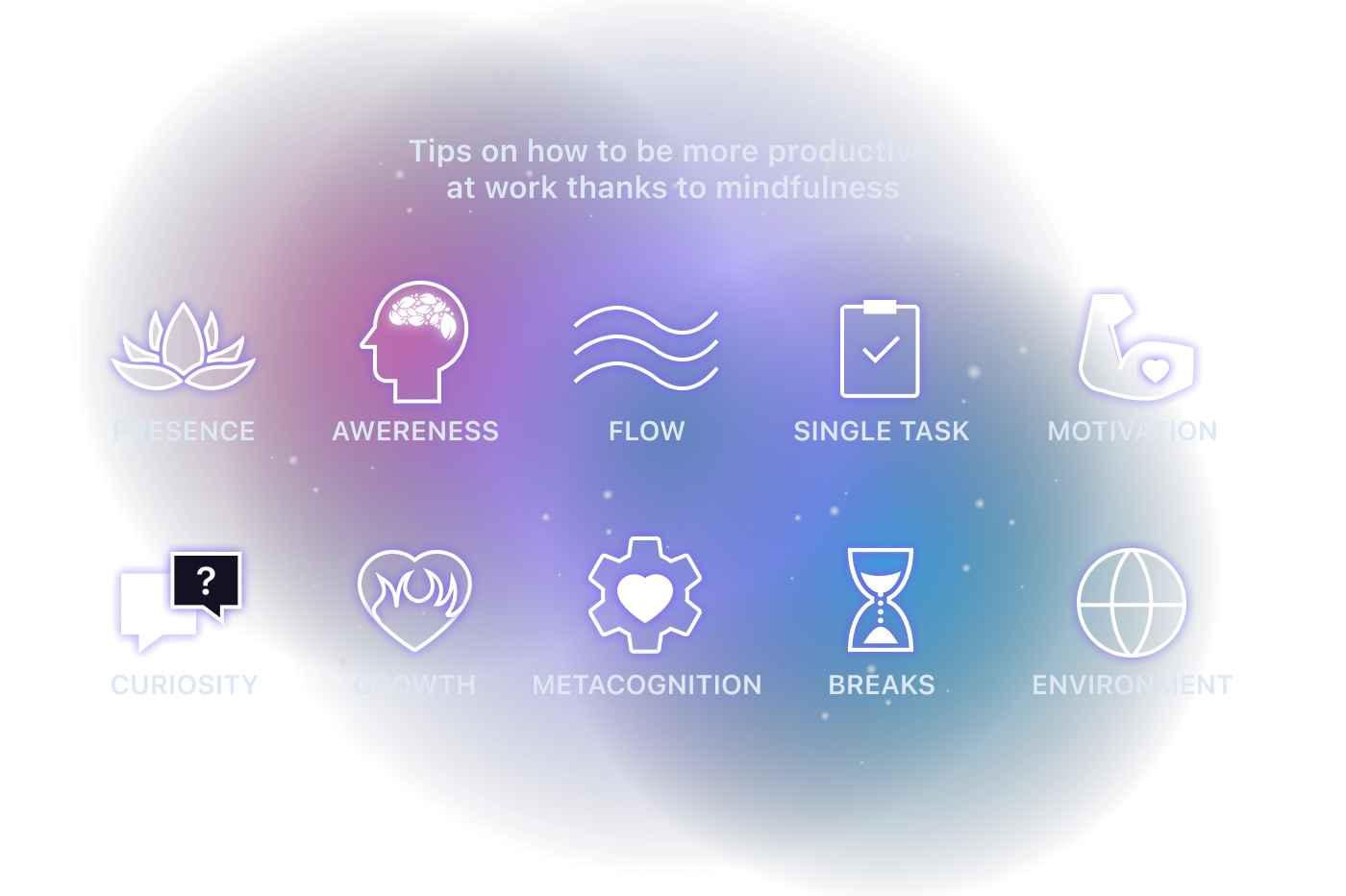
Tips on how to be more productive at work thanks to mindfulness
There are many different actions that you can take to be more productive at work. They may differ slightly depending on where are you working from. Covid-19 changed working conditions for a lot of people, not only by forcing a lot of people into home office but also by showing to some companies that working from home can be just as efficient and good for their employees. Some of the companies have decided to give the choice to their employees or keep a hybrid or remote mode of working even after lockdown. Whether you’re forced to work from home or you’re simply enjoying it, it’s still advisable to take some steps to ensure good working conditions for yourself.
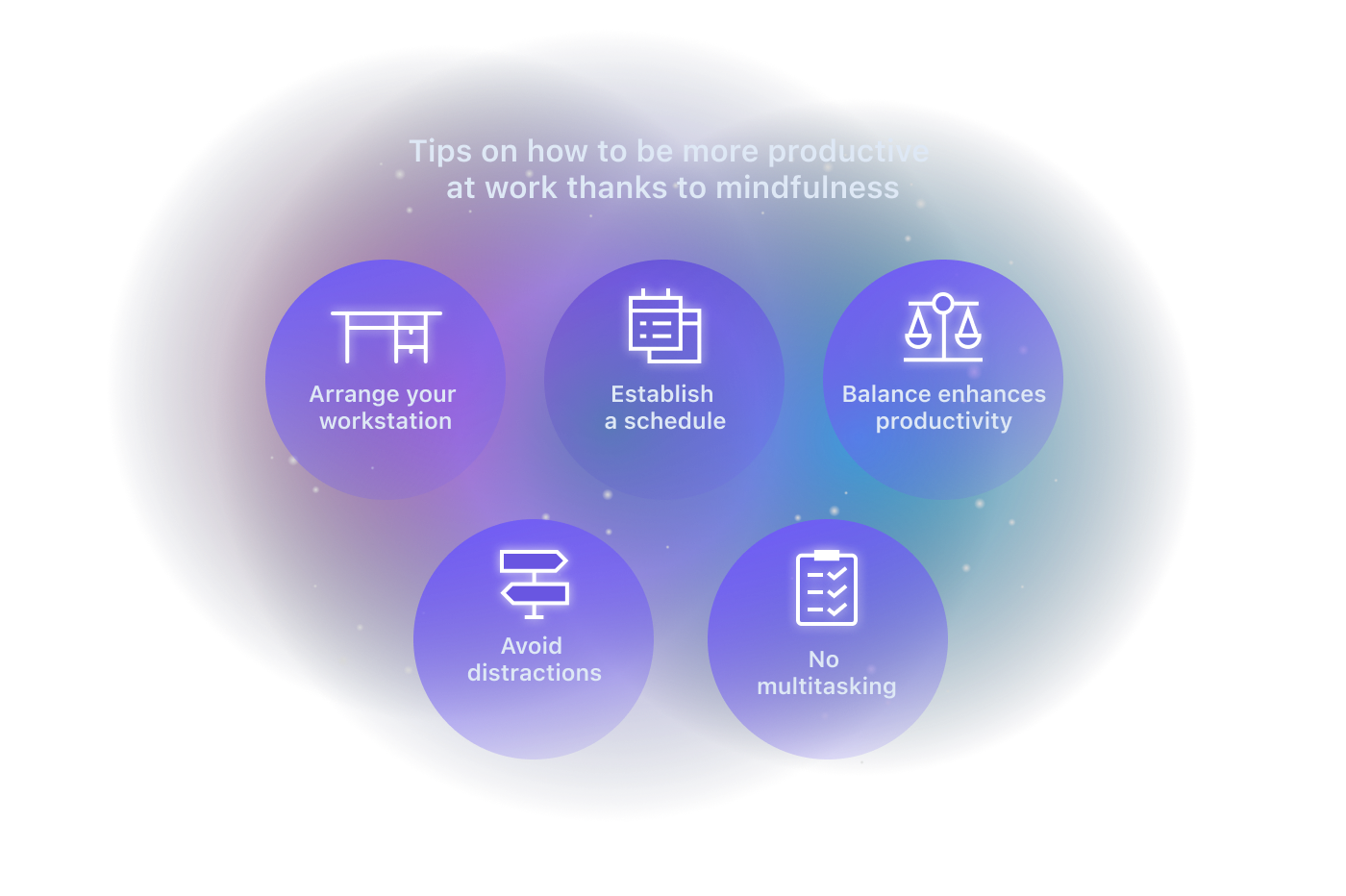
An area designated as your workstation
Defining your workspace may help you avoid getting in the way of family members or roommates, as well as for them to avoid imposing on you while you’re working. If you can’t have the whole room as an office, you can for example design an area in your living room.
Meditation practice: Establish a schedule
Secondly, you’d want to establish a schedule and stick to it. While working from the office, even though we sometimes find ourselves talking to our coworkers over a cup of coffee or tea, we don’t tend to linger as much as we do at home. It’s easy to get distracted while you’re in your own space and with no other people working around you. If you try to maintain the same hours as you do at work, avoid staying after hours or having too long breaks, you should generally feel more balanced than if you let work get intertwined with your free time too much or vice versa.
Productive meditation: Balance enhances productivity
You need to find the right balance between toiling in the present moment, being mindful of your coworkers, and not rushing through eating, walking, driving - do it slower. Being methodical, thorough, and not rushing through tasks can have a positive effect on your work - don’t be too hard on yourself. Take your time. Find your own pace.
Balancing your work is important and so is balancing your nutrition, food, regular exercise, and sleep. It’s easy to let work slip into your free time when you’re working from home, especially if you have a knack for overworking and staying longer to finish your tasks.
It's important to stay focused on your tasks and to not let other activities distract you, especially if you're working from home, but not overworking yourself is just as important. You need to know when to say ‘stop’ and put the laptop away. Working 24/7 isn’t good for anybody - be kind to yourself, use your free time to unwind, exercise, meditate or rest, and remember that enough relaxation can fuel you and help you accomplish your goals more easily.
Practice productive meditation: Avoid distractions
Finding a quiet spot in your apartment or putting on headphones at the office to drown the sounds and focus more easily on your tasks is not the only thing you may consider doing in order to find your focus. To create a distraction-free environment start by turning off all of your devices (that are not needed for your work) and avoiding logging into social media. If you have your headphones on you can always pick calming songs that are good for concentration or even listen to some easy meditations to improve productivity.listen to some easy meditations to improve productivity.
Multitasking
Have you ever heard that multitasking is a desirable trait? Have you been told that multitasking is something you should work on and be good at? Throw these ideas away! Multitasking is a farce! Studies show that focusing on one task at a time is actually a lot more effective and productive than jumping between a few tasks at the same time. Moreover, switching through tasks like that can cost you even as much as 40% of your productive time. According to Harvard researchers, if you’re like the average person, you’re lost in thought 47% of the time, and multitasking can keep you stuck there. So, even though people believe that multitasking is good for you, it actually isn’t.
Last but not least: start your day with meditation.start your day with meditation.10 minutes of mindfulness in the morning can help you improve focus and calm throughout the day, it can help with decision making, as well as maintaining self discipline and calm mind. As was already mentioned, you can create a playlist of some calm songs that are good for concentration, you can find a quiet room, close your eyes and just breathe for a few minutes. Be aware of your thoughts as they come and go, observe them without judging or resisting them. You’ll feel more focused and productive throughout the day thanks to those few minutes of mindfulness.
A growth mindset
Developing a growth mindset is also crucial when it comes to being productive at work. But what does it mean to have a growth mindset? It means that you believe in improving your intelligence and skills through hard work. It makes you more resilient and improves long-term performance. If you strive to have a growth mindset, you should focus on changing your attitude towards your skills and learning process. Quit thinking “I don’t know how to code” and start thinking “I don’t know how to code yet”. Believe in yourself and in your growth. You’re not there yet but you will be if you put your mind to it and work hard to achieve it. Many people don’t realize this but a lot of the things that we think we cannot do, have or achieve are only out of our reach because we let them. Our negative thinking is what keeps us from seeing results most of the time.
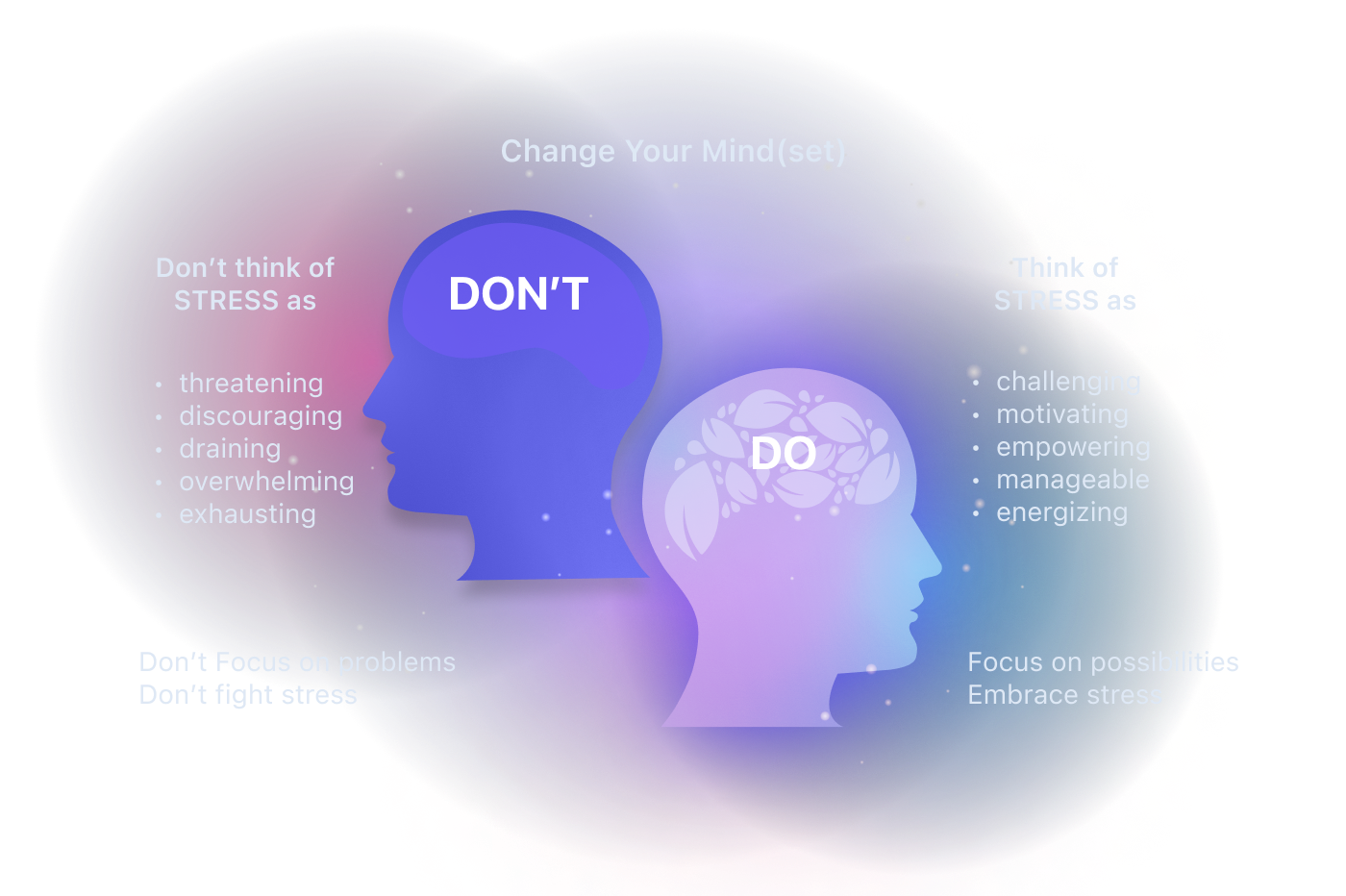
If you keep telling yourself that you’ll never be able to speak English then you never will. Tell yourself that you can’t speak English yet instead, that it’s just a matter of time and hard work. Most of the barriers exist in our heads only. Once we get rid of them, a lot of doors open for us.
Metacognition
It’s also advisable to use metacognitive strategies. Metacognition is a process of thinking about thinking or learning, it’s an awareness of your thought process and an understanding of the patterns behind it. You can practice it by taking the time to plan, monitor, and evaluate your working and learning experiences.
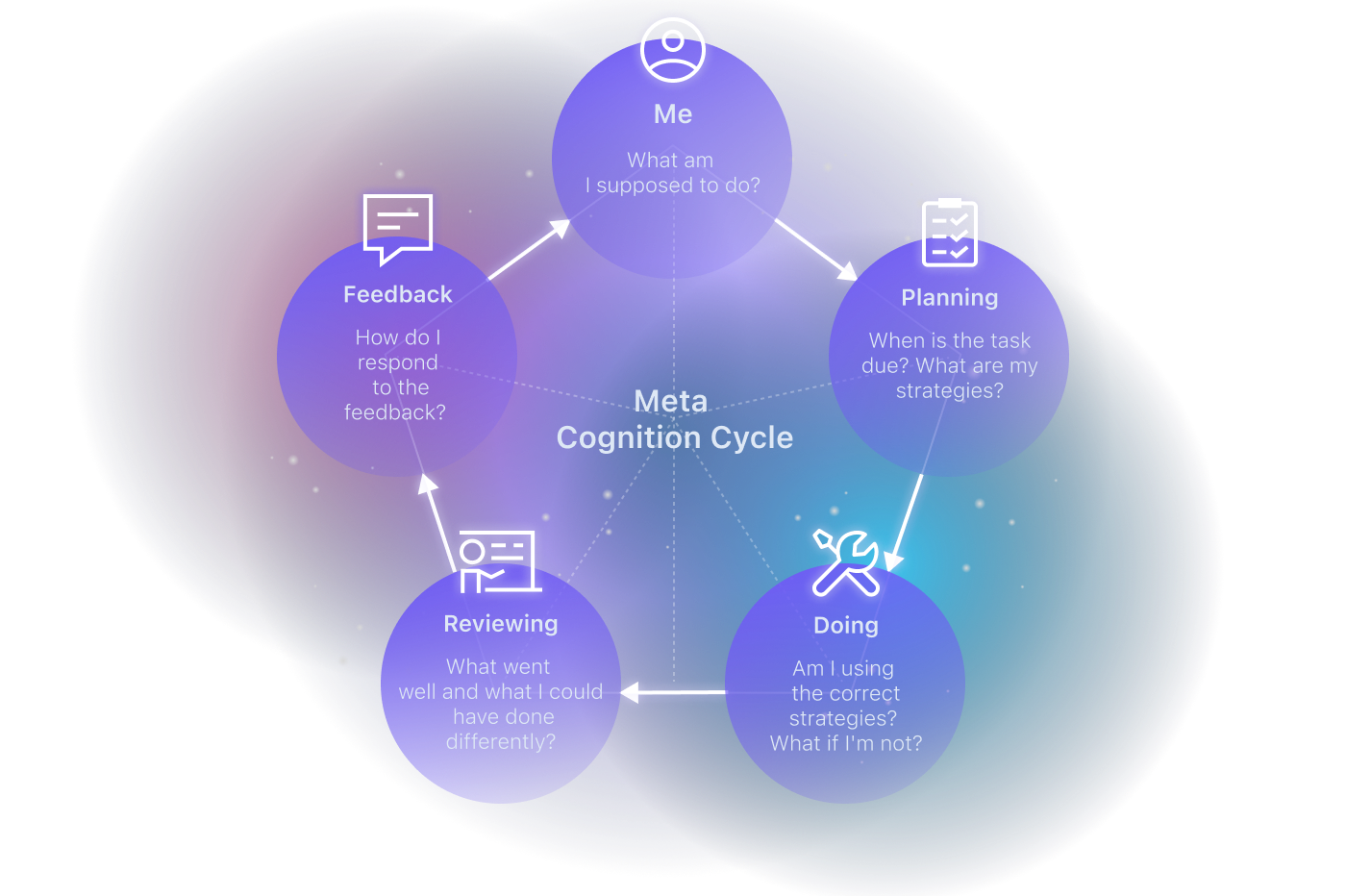
Most of these tips you can use both when working from home and when you’re working from the office. It may seem like a lot, but if you think about it, to succeed you just need to remember about the core principles of mindful productivity: to be present, be aware of your thoughts, emotions, as well as your work environment, and bring your full attention to your work. This is the recipe for productivity, creativity, and enjoying your work more.
If you want to learn more about productive meditation at work and even try to practice productive meditation, Take3Breaths App offers easy meditations to listen to, guided meditation, and a lot of materials on productivity at work. You’ll find tutorials on eliminating fear, preparing for meditation, resistance, and many more. Guided meditations prepared for you by Take3Breaths help with productivity. Incorporate productive meditation sessions into your daily routine to increase productivity levels, lower stress levels and keep your mind cool.
Moreover, guided meditation helps to deal with stress & anxietystress & anxiety, motivation, creativitycreativity, and more! Start your meditation journey today and gain inner peace!
Updated: 14.10.2022
- +Does meditation increase productivity?Yes, meditation helps with productivity by deepening our concentration, reducing mind-wandering, and making it easier to focus. Research shows that meditation increases work satisfaction and helps achieve better results at work.
- +How do you do productive meditation?Productive meditation sessions are about taking a physical action (such as walking, running, biking, driving, showering even) while also focusing on one, particular, well-defined problem.
- +Which meditation helps to improve concentration?Walking meditation is particularly good at improving concentration. To practice it you'll need to focus on your feet and legs' movement and sensations as they touch the ground while you're walking.
- +How do I meditate to stop procrastinating?Focusing your mind and replacing emotional thoughts with rational awareness of them can be really helpful when it comes to procrastinating. Practicing meditation every day is also a great way to strengthen self-discipline.

 Take3Breaths
Take3Breaths

